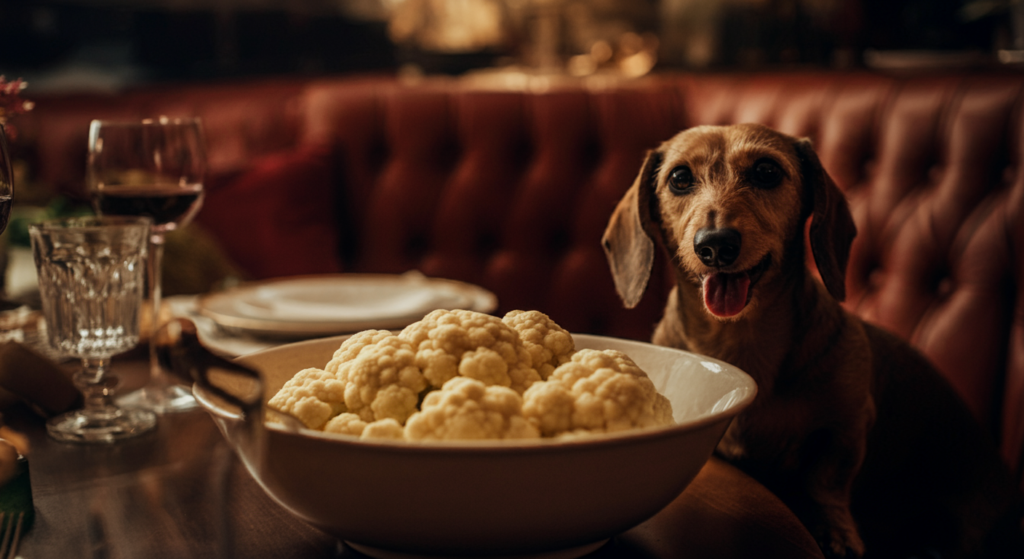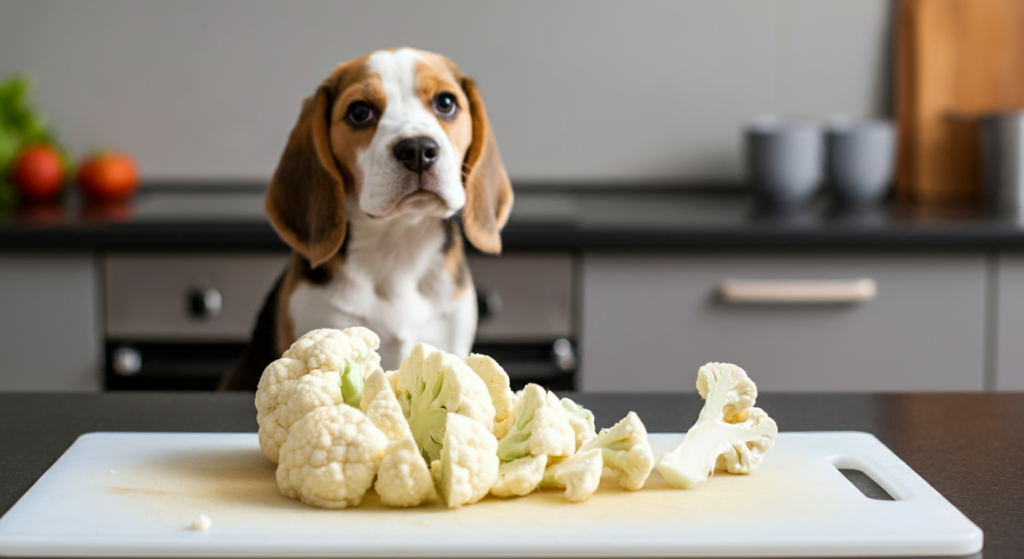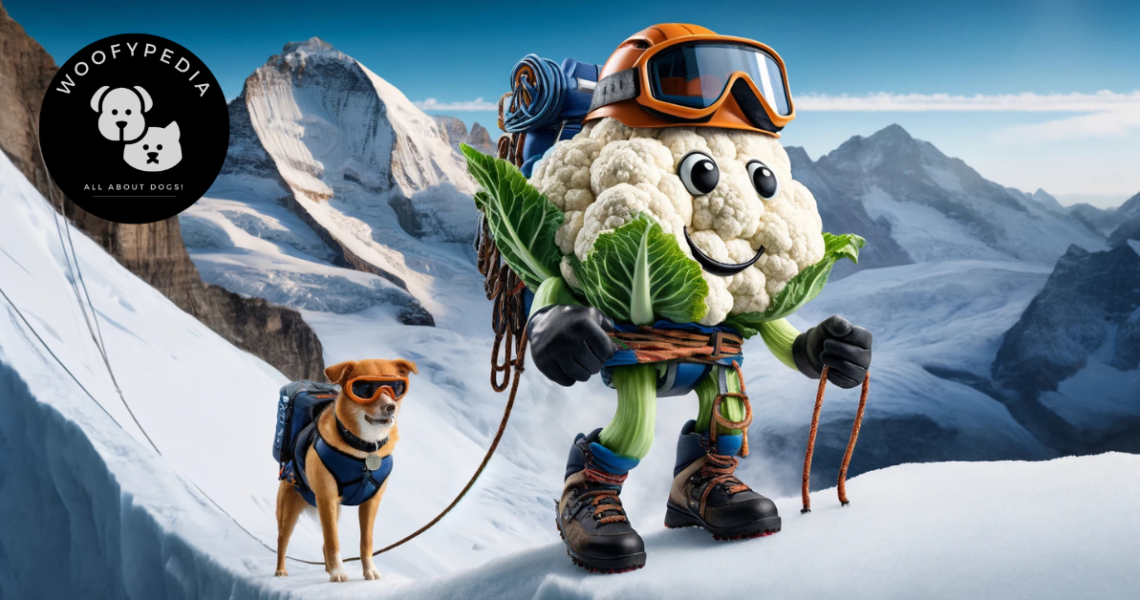Can dogs eat Cauliflower?
Cauliflower and Canines: Snack or Concern?
As dog owners, we’re always on the lookout for safe and healthy foods to share with our furry friends. With so many human foods potentially harmful to dogs, it’s only natural to question the safety of everyday items. Cauliflower, a popular and versatile vegetable, often raises curiosity: “Can dogs eat cauliflower?” While it’s a nutritious choice for humans, is it safe for our canine companions? Understanding this can help you make informed choices for your pet.
Yes, dogs can eat cauliflower, but there are a few key things to keep in mind. When prepared properly and offered in moderation, cauliflower can be a healthy treat for dogs. However, like any new food, it’s important to consider factors like preparation, portion size, and your dog’s individual dietary needs. Let’s explore the benefits and potential risks of cauliflower to help you make the best decision for your dog.
Table of Contents

What Is Cauliflower?
Cauliflower is a cruciferous vegetable known for its dense, white florets and mild flavour. It’s a member of the Brassica family, which also includes broccoli, kale, and Brussels sprouts. Rich in vitamins, minerals, and fibre, cauliflower is often lauded for its health benefits in human diets.
In cooking, cauliflower is enjoyed raw, steamed, roasted, or pureed. However, these preparations can impact how suitable it is for dogs. Understanding the differences is key to safely incorporating cauliflower into your dog’s diet.
Can Dogs Eat Cauliflower?
The simple answer is yes, dogs can eat cauliflower, provided it’s prepared appropriately. Cauliflower is low in calories and packed with nutrients, making it a great occasional snack. However, preparation matters. Plain, cooked cauliflower (steamed or boiled) is easier for dogs to digest and reduces the risk of bloating compared to raw cauliflower.
When introducing cauliflower to your dog, start with small portions to avoid digestive upset. Avoid adding seasonings, oils, or butter, which can be harmful to dogs.
What Are the Benefits of Cauliflower for Dogs?
Cauliflower offers several health benefits when prepared correctly and given in moderation. While not a necessary part of a dog’s diet, it can provide a nutritious boost. Here are some of the potential benefits:
1. Rich in Vitamins and Minerals
Cauliflower contains:
- Vitamin C: Supports a healthy immune system and may reduce inflammation.
- Vitamin K: Aids in blood clotting and bone health.
- Folate: Supports cell growth and metabolic functions.
- Potassium: Helps maintain healthy muscles and nerves.
2. High in Fibre
The dietary fibre in cauliflower can promote healthy digestion and regular bowel movements. Fibre may also help dogs feel fuller, making it a good low-calorie option for overweight pets.
3. Low in Calories
Cauliflower is a great treat for dogs who need to maintain or lose weight. Its low-calorie content allows for guilt-free snacking.
4. Antioxidant Properties
Cauliflower is rich in antioxidants, which help fight free radicals in your dog’s body. These compounds support overall health and may reduce the risk of certain diseases.
5. Potential for Anti-Inflammatory Benefits
The compounds in cauliflower may help reduce inflammation, supporting joint and overall health, especially in older dogs.
Are There Risks to Feeding Dogs Cauliflower?
While cauliflower is generally safe for dogs, there are some potential risks to be aware of:
1. Digestive Upset
Cauliflower, particularly when raw, can cause gas, bloating, or diarrhoea in some dogs. This is due to its high fibre content and certain natural compounds that are harder for dogs to digest. Cooking cauliflower can minimise these risks.
2. Choking Hazard
Large pieces of cauliflower can pose a choking hazard, especially for smaller dogs. Always cut it into bite-sized pieces before serving.
3. Harmful Additives
Avoid seasoning cauliflower with ingredients like garlic, onion, or excessive salt, which are toxic to dogs. Stick to plain, unseasoned cauliflower to keep it safe.
4. Allergic Reactions
Although rare, some dogs may be allergic to cauliflower. Symptoms of an allergic reaction include:
- Itching or scratching
- Swelling of the face or paws
- Difficulty breathing
If you notice these symptoms, stop feeding cauliflower and contact your veterinarian immediately.

How to Serve Cauliflower to Dogs
To safely incorporate cauliflower into your dog’s diet, follow these tips:
- Cook It: Steamed or boiled cauliflower is easier to digest than raw.
- Keep It Plain: Avoid adding seasonings, oils, or sauces.
- Start Small: Introduce cauliflower in small amounts to monitor for any adverse reactions.
- Cut It Up: Chop the cauliflower into bite-sized pieces to prevent choking.
- Limit Portions: Use cauliflower as an occasional treat, not a meal replacement.
How Much Cauliflower Can Dogs Eat?
Portion size depends on your dog’s size and dietary needs. Small dogs should only have a few small florets, while larger breeds can tolerate a bit more. As a general rule, treats (including cauliflower) should make up no more than 10% of your dog’s daily caloric intake.
If your dog shows signs of digestive upset, such as gas or diarrhoea, reduce the amount or discontinue feeding cauliflower altogether.
Can Puppies Eat Cauliflower?
Yes, puppies can eat cauliflower, but it should be given in moderation and prepared properly to ensure it’s safe and digestible for their developing digestive systems. Cauliflower is packed with essential nutrients like vitamins C and K, fibre, and antioxidants, which can offer health benefits to your growing puppy when introduced cautiously.
How to Serve Cauliflower to Puppies
- Cooked is Better: For puppies, cooked cauliflower is the safer choice as it’s softer and easier for them to chew and digest. Steam or boil it without any seasonings, oils, or butter.
- Small Portions: Always serve cauliflower in small amounts to prevent stomach upset or gas. For young puppies, start with just a teaspoon-sized piece to see how they respond.
- Chop into Bite-Sized Pieces: Whether raw or cooked, ensure the cauliflower is chopped into small, manageable pieces to avoid choking hazards.
Precautions
- Avoid Overfeeding: Too much cauliflower can cause bloating, gas, or diarrhoea in puppies due to its high fibre content.
- Monitor for Allergies: Some puppies may have sensitive stomachs or allergies. After introducing cauliflower, observe your puppy for any signs of discomfort, such as vomiting or diarrhoea.
- Raw Cauliflower: While raw cauliflower is not toxic, it’s harder to digest and may cause more gastrointestinal upset in puppies. Stick to cooked cauliflower for their sensitive stomachs.
When to Avoid Cauliflower for Puppies
If your puppy already has a sensitive stomach or is experiencing digestive issues, it’s best to avoid introducing new foods like cauliflower until they recover. Always consult your vet before adding new foods to your puppy’s diet, especially if they have specific dietary needs or conditions.
Puppies can safely enjoy cauliflower as an occasional treat when it’s cooked and served in small, plain portions. It’s a healthy, nutrient-rich vegetable that can complement their diet, but moderation is key to avoiding digestive discomfort. If you’re ever unsure, consult your veterinarian to ensure cauliflower is the right treat for your growing puppy.
Fun Facts About Dogs and Cauliflower
- Some dogs enjoy the crunchy texture of raw cauliflower, while others prefer it cooked and soft.
- Cauliflower is part of the same vegetable family as broccoli, another dog-friendly treat when prepared properly.
- The antioxidants in cauliflower are not just good for dogs—they’re beneficial for humans too!
Conclusion
So, can dogs eat cauliflower? Yes, with proper preparation and in moderation. Plain, cooked cauliflower can be a nutritious and low-calorie treat for your furry friend. Avoid raw or seasoned cauliflower and introduce it gradually to avoid digestive upset. As always, consult your veterinarian if you’re unsure about adding new foods to your dog’s diet.
Have you tried giving your dog cauliflower? Share your experience below!
FAQ: Cauliflower and Dogs
1. Can dogs eat cauliflower leaves?
Yes, dogs can eat cauliflower leaves in moderation. They are not toxic and can provide fibre, but always ensure they are washed thoroughly and served in small amounts to avoid digestive upset.
2. Can dogs eat broccoli?
Yes, dogs can eat broccoli in moderation. It is a healthy vegetable packed with vitamins and fibre, but too much broccoli can cause stomach irritation due to its isothiocyanates.
3. Can dogs eat cauliflower cooked?
Yes, cooked cauliflower is safe for dogs and is often easier for them to digest than raw cauliflower. Make sure it is plain and not cooked with oils, butter, salt, or seasonings.
4. Can dogs eat cauliflower raw?
Yes, dogs can eat raw cauliflower, but it should be given in small amounts to prevent bloating or gas. Cut it into bite-sized pieces to avoid choking.
5. Can dogs eat cauliflower stem?
Yes, dogs can eat cauliflower stems. However, stems are firmer and may be harder to chew, so it’s best to cook or chop them into smaller pieces to make them easier to eat.
6. Can dogs eat cauliflower rice?
Yes, dogs can eat cauliflower rice as long as it’s plain and unseasoned. It can be a healthy low-calorie addition to their diet.
7. Can dogs eat cauliflower and carrots?
Yes, dogs can eat cauliflower and carrots together. Both are safe and nutritious for dogs when served plain and in moderation.
8. Can dogs eat cauliflower and broccoli?
Yes, dogs can eat cauliflower and broccoli. Both vegetables are safe and healthy, but remember to serve them plain and avoid overfeeding, as too much can cause stomach upset.
9. Is cooked cauliflower okay for dogs?
Yes, cooked cauliflower is perfectly okay for dogs. It’s easier for them to digest and can be a great addition to their diet as a healthy treat, as long as it’s plain and free from seasoning or additives.
